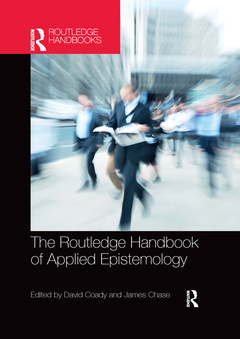Description
The Routledge Handbook of Applied Epistemology
Routledge Handbooks in Philosophy Series
Coordinators: Coady David, Chase James
Language: English
Subject for The Routledge Handbook of Applied Epistemology:
Keywords
Young Man; Procedure Independent Standards; david coady; NRSRO; applied epistemology; Quod Nihil Scitur; epistemology; Inductive Risk; applied philosophy; Condorcet’s Jury Theorem; ethics; Knowledge Acquisition; applied ethics; political philosophy; Charles Pigden; social epistemology; Epistemic Injustice; Epistemic Institutions; descartes; Epistemic Peers; locke; Testimonial Knowledge; scepticism; Sponsorship Bias; conservatism; Feminist Epistemology; hume; Epistemic Democracy; mill; Thomson’s Account; marx; Prison Abolition; postmodern epistemology; Epistemic Practices; Vaccine Refusal; propoganda; Crowd View; ideology; Language Games; surveillance; Clinical Practice; privacy; Individualized Evidence; Ethical Expertise; philosophy of education; philosophy of law; philosophy of science and technology; internet; improvised knowledge; evidence based medicine; philosophy of medicine; medical ethics; James Chase; Paul Smart; Nigel Shadbolt; Karen Frost-Arnold; Hanna Kiri Gunn; Michael P; Lynch; Don Fallis; Daniel Halliday; Helen McCabe; Jason Brennan; Andrea Pitts; Randal Marlin; Stephen John; Robyn Bluhm; Kirstin Borgerson; Daniel Steel; Georgi Gardiner; Lisa Warenski; Ben Kotzee; Tim Kenyon; Steve Fuller; Axel Gelfert; Tommaso Bertolotti; Lorenzo Magnani; M; R; X; Dentith; Brian L; Keeley; Bryan Frances; Christopher Cowley; Matthew Sharpe
Publication date: 12-2020
· 17.4x24.6 cm · Paperback
Publication date: 08-2018
· 17.4x24.6 cm · Hardback
Description
/li>Contents
/li>Readership
/li>Biography
/li>
While applied epistemology has been neglected for much of the twentieth century, it has seen emerging interest in recent years, with key thinkers in the field helping to put it on the philosophical map. Although it is an old tradition, current technological and social developments have dramatically changed both the questions it faces and the methodology required to answer those questions. Recent developments also make it a particularly important and exciting area for research and teaching in the twenty-first century. The Routledge Handbook of Applied Epistemology is an outstanding reference source to this exciting subject and the first collection of its kind. Comprising entries by a team of international contributors, the Handbook is divided into six main parts:
- The Internet
- Politics
- Science
- Epistemic institutions
- Individual investigators
- Theory and practice in philosophy.
Within these sections, the core topics and debates are presented, analyzed, and set into broader historical and disciplinary contexts. The central topics covered include: the prehistory of applied epistemology, expertise and scientific authority, epistemic aspects of political and social philosophy, epistemology and the law, and epistemology and medicine.
Essential reading for students and researchers in epistemology, political philosophy, and applied ethics the Handbook will also be very useful for those in related fields, such as law, sociology, and politics.
Notes on contributors. PART IIntroduction1.The return of applied epistemology, James Chase and David Coady. PART IIThe internet. 2.The World Wide Web, Paul Smart and Nigel Shadbolt. 3.Wikipedia, Karen Frost-Arnold. 4.Googling, Hanna Kiri Gunn and Michael P. Lynch. 5.Adversarial epistemology on the internet, Don Fallis. PART IIIPolitics. 6.John Stuart Mill on free speech, Daniel Halliday and Helen McCabe. 7.Epistemic democracy, Jason Brennan. 8.Epistemic injustice and feminist epistemology, Andrea Pitts. 9.Propaganda and ideology, Randal Marlin. PART IVScience. 10.Expertise in climate science, Stephen John. 11.Evidence-based medicine, Robyn Bluhm and Kirstin Borgerson. 12. The precautionary principle in medical research and policy: the case of sponsorship bias, Daniel Steel. 13Psychology and conspiracy theories, David Coady. PART VEpistemic institutions. 14Legal burdens of proof and statistical evidence, Georgi Gardiner. 15. Banking and finance: disentangling the epistemic failings of the 2008 financial crisis, Lisa Warenski. 16. Applied epistemology of education, Ben Kotzee. PART VIIndividual investigators. 17.Disagreement, Tim Kenyon. 18.Forecasting, Steve Fuller. 19. Rumor, Axel Gelfert. 20.Gossip, Tommaso Bertolotti and Lorenzo Magnani. 21. The applied epistemology of conspiracy theories: an overview, M R.X Dentith and Brian L. Keeley. PART VIITheory and practice in philosophy. 22.Philosophical expertise, Bryan Frances, 23. Ethical expertise, Christopher Cowley. 24.The demise of grand narratives? Postmodernism, power-knowledge, and applied epistemology, Matthew Sharpe. Index.
David Coady is Senior Lecturer in Philosophy at the University of Tasmania, Australia. He is the author of What to Believe Now: Applying Epistemology to Contemporary Issues (2012), the co-author of The Climate Change Debate: An Epistemic and Ethical Enquiry (2013), the editor of Conspiracy Theories: The Philosophical Debate (2006) and theco-editor of A Companion to Applied Philosophy (2016).
James Chase is Senior Lecturer in Philosophy at the University of Tasmania, Australia. He works on epistemology; philosophical logic, particularly as applied to epistemological issues; and the methodology of analytic philosophy. He is the co-author of Analytic vs Continental (2011) and the co-editor of Postanalytic and Metacontinental (2010).



